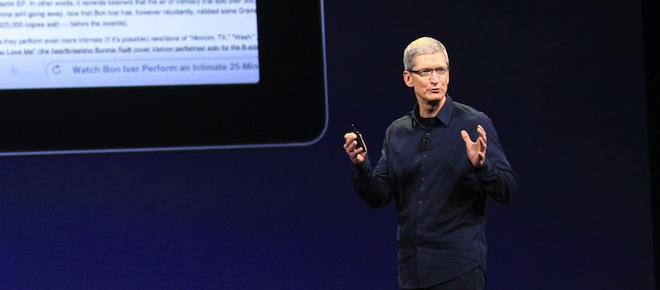Apple’s iPad announcement was not magical, but fanciful
Tim Cook lacks Steve Jobs’ inspired word choices, but his rhetoric is equally lofty
Apple CEO Tim Cook introduces the new iPad during an event in San Francisco, Wednesday, March 7, 2012. The new iPad features a sharper screen and a faster processor. Apple says the new display will be even sharper than the high-definition television set in the living room. (AP Photo/Jeff Chiu)
Share
When Steve Jobs revealed new Apple products to the company faithful, his rhetoric leaned towards the abstract: iThis “changed everything.” iThat was “magical.”
Now that Jobs’ protege, Tim Cook, is the face of Apple, it would seem such descriptions have been hung up alongside Jobs’ trademark turtlenecks. If last week’s iPad unveiling is any indication, Cook—in a manner perhaps befitting his former status as Apple’s Chief Operating Officer—prefers his marketing pitches to be more grounded, almost quantifiable. Rather than claim the new iPad changed everything for a third time, Cook instead claimed his company’s latest offering is “the poster child of the post-PC world.”
So, now that the dust has settled, I thought I’d see how everyone is enjoying life in Cook’s future. Are college students writing term papers on touchscreens and playing Mass Effect 3 on their tablets? Have a wealth of Macbooks popped up on Craigslist for $50 OBO? Did you wisely to divest your portfolio of shares in now-insoluble companies like Dell and Acer?
Facetiousness aside, this isn’t just another hit piece on Apple. The company should be allowed to promote its products however it sees fit. However, whereas calling something “magical” is purely promotional hyperbole, the stakes are a bit higher when it comes to celebrating the end of personal computers. As I result, I’ve got a couple of bones to pick with Cook’s conception of a post-PC world.
Firstly, is the term even appropriate for a discussion of tablet computers? By and large, people use their tablets for surfing the web, checking email, reading books, playing games and watching television. I’m writing this blog post on a laptop that can already do all of that. The only difference is that the device I’m working on lacks a touchscreen. Not to downplay the significance of interface design, but I’m not sure changing the way we interact with personal computers renders them into something other than personal computers.
Secondly, is Cook’s interpretation of the data correct, or is it just more spin? One of the most blogged and re-blogged images from last week’s presentation was Cook’s evidence for the dawning of the post-PC era: a chart showing that Apple sold more iPads in the last quarter of 2011 than any PC manufacturer sold of its computers. Credit to Apple for engineering one of the most successful product launches in recent history, but all Cook’s chart really proves is that people can own a regular PC and a tablet.
In fact, in the wake of Cook’s proclamation, the folks at Gartner have forecast demand for PCs will actually increase over the next two years. According to Gartner’s Research Director Ranjit Atwal, an estimated 368 million PC units will be sold in 2012, an increase of 4.4 per cent over 2011. By Atwal’s calculations, the market will grow to 400 million units in 2013. That’s ten times as many iPads as Apple sold last year.
On reflection, maybe Cook’s slogans aren’t really any less fanciful than Jobs’ were.
